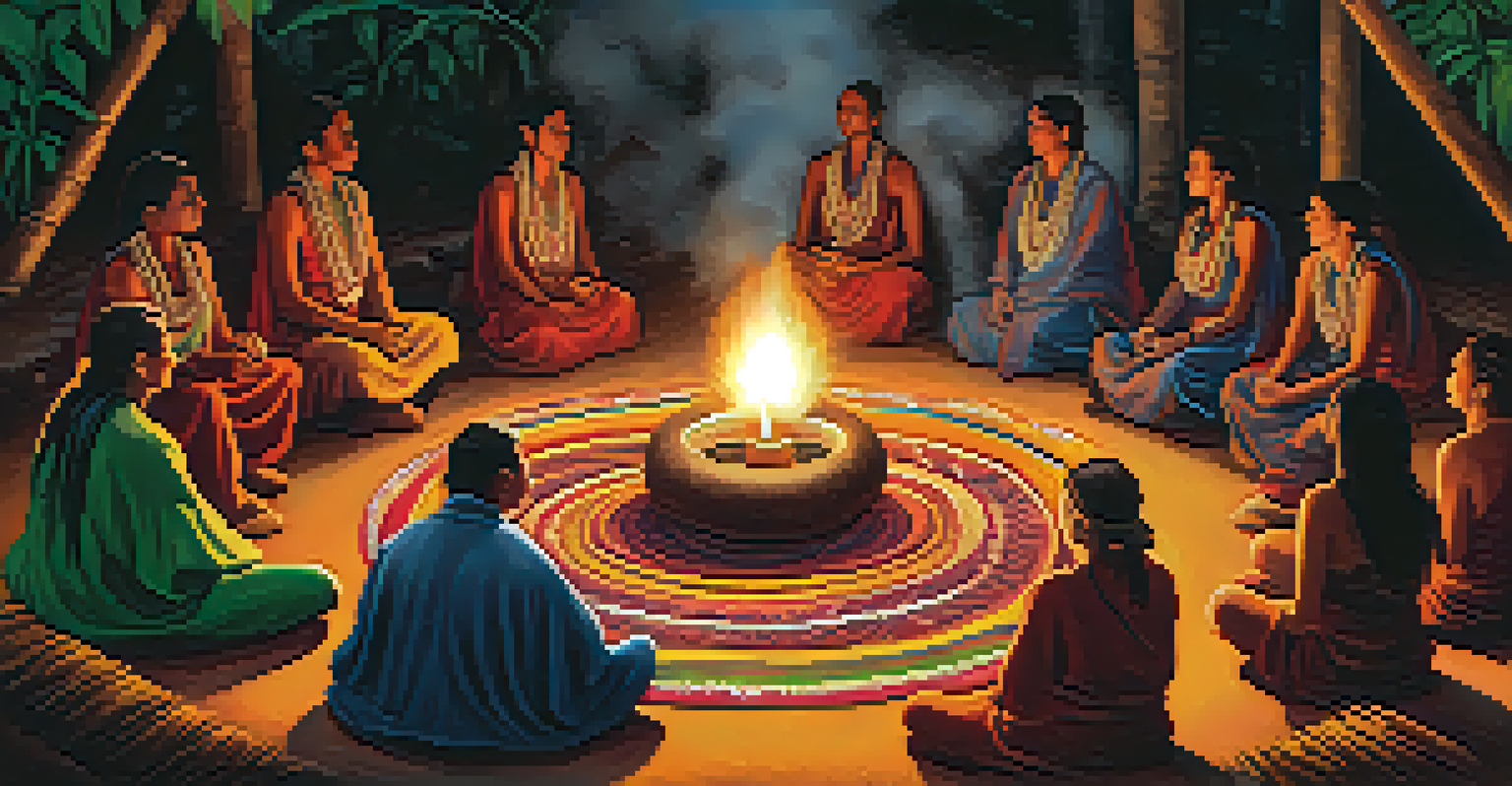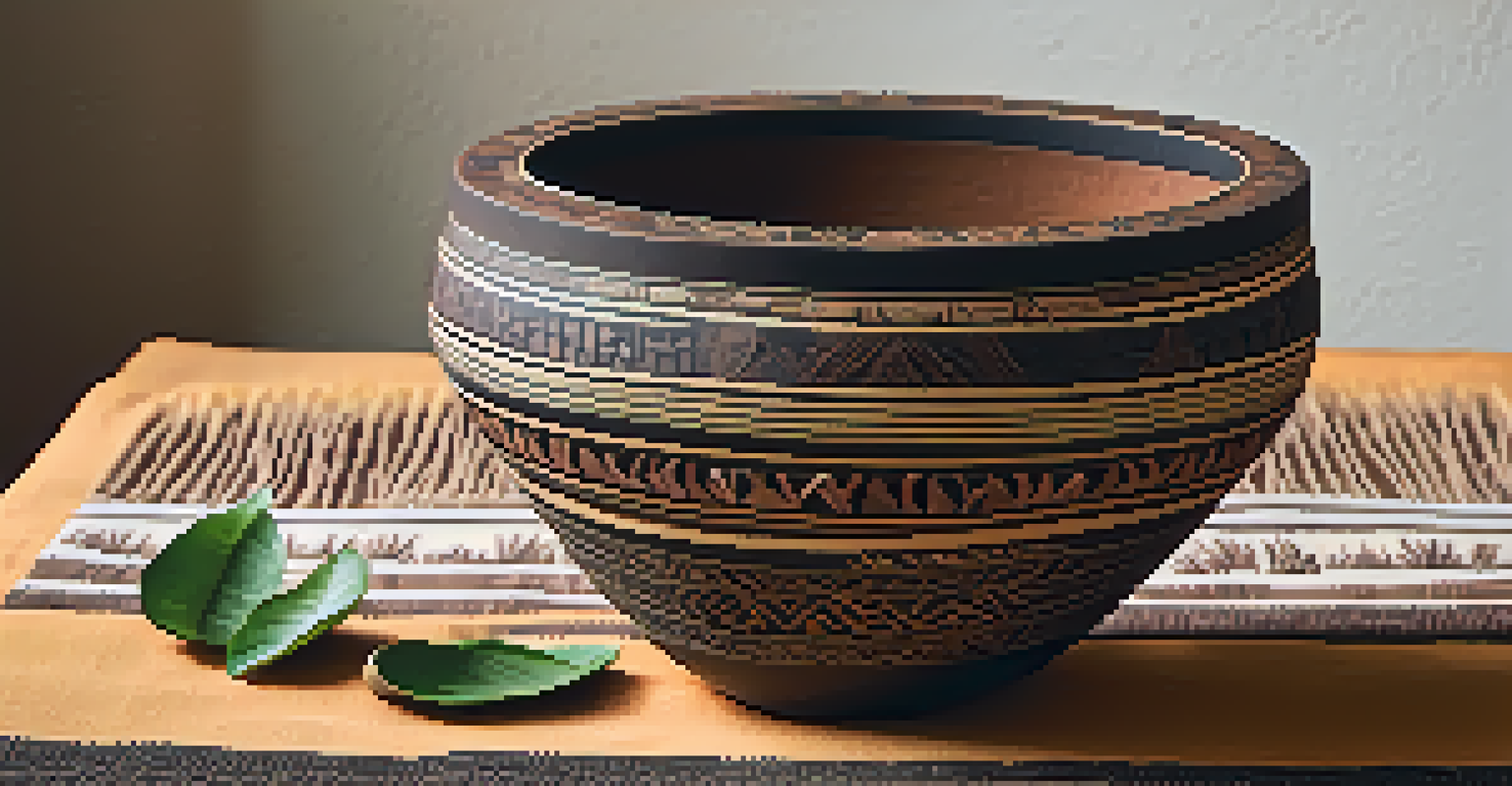The Intersection of Spirituality and Ethics in Ayahuasca Use

Understanding Ayahuasca: A Brief Overview
Ayahuasca is a powerful brew made from the Banisteriopsis caapi vine and other plants, traditionally used in spiritual ceremonies by indigenous cultures in the Amazon. It is renowned for its psychoactive properties, primarily due to the presence of DMT (dimethyltryptamine), which can induce profound altered states of consciousness. These experiences often lead participants to deep introspection, healing, and spiritual revelations.
The plants are our teachers, they give us guidance and protection on our path to healing.
The ritualistic use of ayahuasca is not merely about the substance itself; it embodies a holistic approach to healing that intertwines physical, emotional, and spiritual dimensions. Many people who engage with ayahuasca do so in a quest for understanding, personal growth, or resolution of trauma. This multifaceted nature of the experience raises essential questions about the ethics surrounding its use.
As ayahuasca gains popularity beyond its traditional contexts, understanding its implications becomes crucial. This article explores the intersection of spirituality and ethics in ayahuasca use, shedding light on the responsibilities that come with such a potent tool for transformation.
The Spiritual Significance of Ayahuasca Rituals
In indigenous cultures, ayahuasca is often viewed as a sacred medicine, integral to spiritual practices and community bonding. The rituals surrounding its use are steeped in tradition, often led by experienced shamans who guide participants through their journeys. This spiritual framework provides a context that enhances the experience, fostering a sense of connection to the universe and to oneself.

Participants frequently report feelings of unity, love, and profound insight during ayahuasca ceremonies, which can lead to spiritual awakenings or a deeper understanding of their place in the world. This spiritual significance is what draws many people to seek out ayahuasca experiences, hoping to tap into these transformative practices. However, the essence of these rituals often gets diluted when removed from their cultural roots.
Ayahuasca's Cultural Significance
Understanding the sacred roots of ayahuasca is crucial for ethical engagement with its use.
Understanding the spiritual significance of ayahuasca is crucial for ethical engagement with the practice. It reminds us that these experiences should be approached with respect and mindfulness, honoring the traditions and beliefs of those who have used them for generations.
Ethical Considerations in Ayahuasca Use
As ayahuasca becomes more mainstream, ethical concerns surface, particularly regarding cultural appropriation and the commodification of sacred practices. Many individuals seeking ayahuasca for personal growth may inadvertently exploit indigenous traditions, often without a proper understanding of their cultural significance. This raises questions about who has the right to access and benefit from these sacred practices.
Intention is the starting point of every dream. It is the creative power that fulfills our purpose.
Furthermore, the increasing number of ayahuasca retreats and shamans offering ceremonies in the Western world can lead to uneven standards of care and safety. Some participants may not receive adequate preparation or support, which can result in challenging or even dangerous experiences. Ethical considerations must therefore include ensuring that practitioners are qualified and that participants are informed and supported.
Navigating these ethical waters is essential for anyone considering ayahuasca use. It’s important to engage with the practice thoughtfully, ensuring that respect for its cultural origins and ethical standards are upheld.
The Role of Intention in Ayahuasca Experience
Intention plays a pivotal role in shaping the ayahuasca experience, guiding participants toward their desired outcomes. Approaching a ceremony with clear intentions can enhance the spiritual journey, providing focus and clarity amidst the often chaotic nature of the experience. For many, setting intentions is a way to align their personal goals with the healing potential of ayahuasca.
However, the power of intention also brings ethical responsibility. Participants must be aware that their intentions can influence the group dynamic and the collective energy of the ceremony. This means that being mindful of one’s intentions not only aids personal growth but also respects the communal aspect of the ritual.
The Importance of Intention
Setting clear intentions enhances the ayahuasca experience while fostering respect for the communal aspect of the ritual.
Ultimately, intentionality in ayahuasca use highlights the interplay between personal desires and ethical considerations. It encourages individuals to reflect on their motivations and the impact they may have on others, fostering a more harmonious environment.
Navigating Post-Ceremony Integration
After an ayahuasca ceremony, the process of integration becomes crucial. This involves making sense of the experiences and insights gained during the journey and applying them to everyday life. Without proper integration, participants may struggle to understand or implement the lessons learned, leading to confusion or emotional distress.
Ethically, it’s important for retreat leaders and shamans to provide guidance on integration, ensuring that participants have the support they need to process their experiences. Integration can take many forms, from personal reflection to group discussions or therapy, all aimed at helping individuals navigate their post-ceremony lives.
Integrating the lessons of ayahuasca isn't just a personal journey; it can also foster a sense of community among participants. Sharing experiences can create bonds and deepen understanding, reinforcing the interconnectedness that ayahuasca emphasizes.
Cultural Sensitivity and Respect in Ayahuasca Practices
Cultural sensitivity is paramount when engaging with ayahuasca, as it is intrinsically tied to the traditions and beliefs of indigenous peoples. Understanding the roots of ayahuasca practices fosters respect and appreciation, allowing individuals to approach the experience with the reverence it deserves. This includes acknowledging the historical context and the spiritual significance it holds for those who have used it for centuries.
Many indigenous communities have voiced concerns about the appropriation of their sacred practices, emphasizing the need for respect and acknowledgment of their contributions. Engaging with ayahuasca should involve a commitment to honoring these traditions, which may include supporting indigenous communities and practices directly.
Navigating Post-Ceremony Integration
Proper integration of experiences gained during ayahuasca ceremonies is vital for personal growth and emotional well-being.
By prioritizing cultural sensitivity, participants can contribute to a more ethical and respectful dialogue around ayahuasca use. This not only enhances the personal experience but also promotes a broader understanding of the importance of preserving these sacred traditions.
Finding Balance: Spirituality and Ethics in Ayahuasca
The intersection of spirituality and ethics in ayahuasca use is a balancing act that requires thoughtful consideration. While the potential for personal transformation is profound, it must be approached with respect for the cultures that have preserved these practices for generations. Finding this balance means recognizing the sacredness of the experience while upholding ethical standards.
Engaging with ayahuasca ethically encourages individuals to reflect on their motivations and the broader impacts of their participation. This means being open to learning from indigenous cultures and understanding the responsibilities that come with accessing such powerful tools for healing and self-discovery.

Ultimately, the journey of ayahuasca use is not just about personal gain; it's about fostering a deeper connection to oneself and the world while honoring the ethical implications of that journey. By embracing both spirituality and ethics, participants can create a more meaningful and respectful experience.